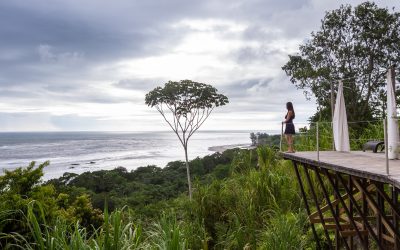

Beachfront Property Laws in Costa Rica: What You Need to Know
by Quatro Legal Real Estate Team | Mar. 08, 2024 | Article, Real Estate
Welcome to another video of the Quatro Legal real estate series. My name is Sonia Aragon. I work as an associate attorney at Quatro Legal. Today, I will be talking about the special regime for beachfront properties. Let’s dive in.
Understanding Beachfront Property Laws in Costa Rica
Most beachfront properties are under a special regime called the maritime zone land. The maritime zone land is the 200 meter wide strip of land along the shorelines.
Out of the 200 meter wide strip, the first 50 meters, called the public zone, is destined for public use and all activities and developments are completely banned. This area’s purpose is for walking and free transit. The remaining 150 meters, called the restricted zone, are subject to a concession. These properties are owned by the state and managed and supervised by the corresponding municipality and the Costa Rican Tourism Board, ICT.
Because lands located within the maritime zone are property of the state, the only legal mechanism by which a person or entry can use and enjoy these properties is by obtaining a concession agreement. This rule applies equally to Costa Ricans and foreigners. A concession agreement can be compared to a lease agreement, in which the landlord is the state, through the municipality, and the tenant is the concessionary.
Understanding Concession Limitations
Concessionaires will never enter the property or own the title, but they will have the concession rights over the property, which can entail the right to use, exploit, commercialize, and even profit per the terms of the applicable zoning plan. It is important to note that unlike fee simple properties, owners do not have the same rights as citizens when it comes to leasing or using the maritime zone land.
This is one of the rare exceptions when it comes to purchasing real estate in Costa Rica. Also there are limitations on the usage for the applicable zoning plan and concession agreement. The law establishes that foreigners cannot be majority owners either at an individual level or through a corporation of a concession.
However, Quatro Legal has strategy methods to legally comply with the restrictions on foreigner ownership. Owning a concession is safe. As concession rights can be inherited, they are granted for less than five years and no more than 20 years, but they can be reviewed indefinitely and typically they’re granted for 20 years.
Also you can profit from the concession. Additionally, with a few exceptions, this is the only way individuals, both foreigners and Costa Rican nationals, can use beachfront properties privately. Surely this is a very particular regime and although it can sound tricky, with the right guidance, it is feasible and can be a smooth process.
Looking for legal counsel in Costa Rica you can trust? Get in touch today.
Disclaimer: The information provided in this blog post is for general informational purposes only and is not intended to constitute legal advice. While we strive to ensure the accuracy and timeliness of the content, laws and regulations are subject to change. For the most accurate and up-to-date information, please contact our office directly. Some images may be AI generated.
Get To Know Quatro Legal

We’re bringing empathy and excellence back to legal counseling. Quatro Legal is built on a bedrock of kindness, a passion for service, and a commitment to guiding you through your legal challenges with ease.
OUR SERVICES
EXPLORE BY
category
REAL
ESTATE
CORPORATE
COSTA RICA
LIFESTYLE
LABOR & EMPLOYMENT
CLIENT
TESTIMONIALS
FREE TRADE
REGIME
All Rights Reserved 2024 | Privacy











